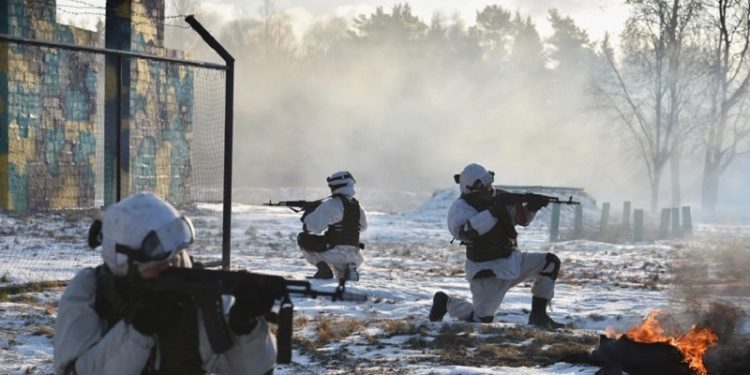The United States and NATO have delivered separate written responses to Russia’s security demands, as efforts to reach a diplomatic solution to the crisis over Ukraine continue.
US Secretary of State Antony Blinken said on Wednesday that the US ambassador to Russia, John Sullivan, delivered Washington’s reply to Moscow, which is seeking security guarantees that NATO will halt its eastward expansion into former Soviet republics.
Blinken said that the letter offers Russia a “serious diplomatic path” to end the impasse.
“The document we’ve delivered includes concerns of the United States and our allies and partners about Russia’s actions that undermine security, a principled and pragmatic evaluation of the concerns that Russia has raised, and our own proposals for areas where we may be able to find common ground,” Blinken told reporters.
The Russian military has been amassing troops near the country’s border with Ukraine, sparking a diplomatic crisis and heightening US and European fears that Russia may be preparing for an imminent invasion of its neighbour.
Russia has denied that it is planning to invade Ukraine, but it has vehemently opposed the country’s efforts to join NATO.
On Wednesday, Blinken stressed that Washington and its allies would not agree to curb the NATO admissions process for new members, saying the military alliance’s door “remains open”.
The top US diplomat did not share the specific details included in the document, but he said it outlined American positions and concerns about Russia’s behaviour, while highlighting areas where Washington and Moscow can cooperate to “advance collective security”.
“Right now, the document is with them, and the ball is in their court,” Blinken told reporters.
NATO responses
Shortly after Blinken’s statement, NATO Secretary-General Jens Stoltenberg said the alliance delivered its own written response to Russia “in parallel with the United States”.
“We call on Russia once again to immediately de-escalate the situation. NATO firmly believes that tensions and disagreements must be resolved through dialogue and diplomacy,” Stoltenberg told reporters.
He called for re-establishing formal ties between Russia and NATO, and opening channels of communication to avoid escalation. The US and NATO have held a series of talks with Russian officials over the past few weeks, but the negotiations so far have failed to end the crisis.
Stoltenberg warned on Wednesday that tensions in eastern Europe are on the rise.
“We see more troops not only in and around Ukraine, but also now in Belarus where Russia is in the process of deploying thousands of troops, hundreds of aircraft, S-400 air defence systems and a lot of other very advanced capabilities,” he said.
Russian Deputy Foreign Minister Alexander Grushko said Russia will “study” the NATO proposal. “We will read it. Study it. The partners studied our project for almost a month and a half,” he told Interfax news agency.
US says Russia likely to use force
The US and its European allies have threatened to impose harsh economic sanctions on Russia should it invade Ukraine. Earlier this week, US President Joe Biden also said sanctions against his Russian counterpart Vladimir Putin were a possibility.
Kremlin spokesman Dmitry Peskov slammed that threat as “politically destructive”, saying on Wednesday that top Russian leaders are prohibited from holding assets abroad, so they would not be affected by sanctions.
The United Kingdom also floated the prospect of sanctioning Putin earlier in the day.
“We’re not ruling anything out,” Foreign Secretary Liz Truss told UK broadcaster Sky News. “We’ll be bringing forward new legislation to make our sanctions regime tougher so we are able to target more companies and individuals in Russia. We will be bringing that forward in the next few days.”
Meanwhile, US Deputy Secretary of State Wendy Sherman said it was likely that Russia will move militarily against Ukraine in the coming weeks, stressing that there is no “defensive justification for Russia to amass so many troops in such a short time on Ukraine’s borders”.
“We certainly see every indication that he is going to use military force sometime, perhaps [between] now and the middle of February,” Sherman said at a virtual event hosted by Yalta European Strategy.
Russia has moved more military assets to Belarus, north of Ukraine, for what it says are joint exercises. It has also intensified military drills, including in areas neighbouring Ukraine.
Still, Ukrainian Foreign Minister Dmytro Kuleba said the number of Russian troops near his country’s border, estimated to be more than 100,000, is still “insufficient” to mount a large scale offensive. “They are still missing some key military elements and systems to mount a big, full-scale offensive,” Kuleba told reporters.
On Tuesday, the US administration had threatened Belarus with a “swift and decisive response” if it assists Russia in invading Ukraine.
Eastern Ukraine talks
Meanwhile, Russia, Ukraine, Germany and France voiced support for maintaining a ceasefire in eastern Ukraine after a round of talks in Paris on Wednesday. The negotiations were part of the Normandy talks, which aim to end the violence in that area.
Russia annexed Ukraine’s Crimean Peninsula in 2014 and shortly thereafter supported a separatist rebellion in the country’s east, where fighting has killed more than 13,000 people and displaced millions.
A joint statement released by the French presidency said advisers to the head of state of the four countries “support unconditional observance of the ceasefire”.
Another round of negotiations is set to take place in Berlin in two weeks. But Dmitry Kozak, the Kremlin’s representative on Ukraine, said Kyiv has failed to respond to proposals made by the Russian-backed separatists.
“Despite all the differences in interpretations, we agreed that the ceasefire [in eastern Ukraine] must be maintained by all the parties in line with the accords,” Kozak said.
French President Emmanuel Macron is set to hold a phone call with Russia’s Vladimir Putin on Friday.
Source: Al Jazeera






 WhatsApp us
WhatsApp us 

